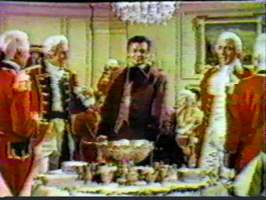


| [ Previous ] [ Next ] |

|
[1955; U.S.; Directed by John Sturges; Written by Karl Tunberg]
This exceedingly obscure film recounts the story of Benedict Arnold's attempt to turn West Point over to the British.1 Its hero, Jack Boulton (Cornell Wilde), is a fictional member of Washington's espionage cadre -- part Benjamin Tallmadge, part standard 1950s romantic lead -- who follows the trail of "Gustavus" (one of the code names Arnold used in his negotiations with Sir Henry Clinton) into the British stronghold of New York City. Posing as a defector, he grows to be close friends with Clinton's adjutant general, Major John André (Michael Wilding), develops a mutual romantic attraction with André's mistress, Sally Cameron (Anne Francis), and becomes an object of deep suspicion for Loyalist Dr. Jonathan Odell (George Saunders). His genuine friendship with André takes a tragic turn when Boulton becomes instrumental in André's capture by the rebels and subsequent sentencing as a spy.
 John André introduces John Boulton to Col. Tarleton (second from left) and others. |
Okay, this is an out-and-out shill. Banastre Tarleton is not actually in this movie. In fact, until Doc M reminded me, I'd forgotten he was even supposed to be in this movie. There is a brief scene in a ballroom where André introduces Boulton to three of his friends -- "Colonel [John Graves] Simcoe", "Captain [Oliver] Delancey" and as he says "Colonel Tarleton" some middle-aged chap in scarlet regimentals shakes Boulton's hand. But it can't be our Tarleton because while the last critical weeks of the Arnold/Clinton/André negotiations were taking place, Banastre was fully occupied in South Carolina, trying not to die of malaria or yellow fever. I'm sure he would have vastly preferred to be hale, hearty and sipping wine in a New York City ballroom!
Still, Banastre's itty-bitty-should-not-be-there cameo provides me with an excuse to call attention to this virtually forgotten film, which makes a fascinating contrast to The Patriot in its presentation of the Revolutionary War. It manages quite handily to tell its story with dramatic highs and lows which are made more poignant by the absence of unbelievable, blacker-than-black, cartoon villains. Even Arnold -- an even worse subject for demonization in American folklore than the British -- remains human, albeit a self-serving man whose highest motivation is greed. Odell, the closest thing the film has to a "villain" in the British camp, is presented as an honorable man, divided from the rebels by political beliefs but not by standards of humanity. Wilding -- nearly forgotten nowadays except as one of the long list of Elizabeth Taylor's ex-husbands -- makes a charming, idealistic and winsome André, even though he is too old for the role. For me, he steals the movie, but then I'm far from an unbiased judge. I adore John André, and I'm enough of an old movie buff to have seen Cornell Wilde in numerous films and found him unbelievably dull in every one of them.
Certainly The Scarlet Coat can be nitpicked to shreds on mechanical flaws such as Tarleton's cameo (wrong age, wrong uniform, wrong city) and some strikingly inaccurate costume work. (Anne Francis really needs to exchange her 1950s torpedo bra for Georgian stays!) It also takes all the standard liberties of dramatization, from stretching or compressing the flow of events to transferring contributions made by others to its fictional hero. But to counterbalance this it gets the important things right, from its balanced viewpoint to the inclusion of dialogue taken from contemporary accounts of André's trial and execution. You come away from it with a reasonable overall impression of the Arnold affair, though, of course, you need to crack the history books to clarify the details. To me this marks a good piece of historical fiction -- something which fires up my interest, and sends me off on a quest for the facts -- so I praise The Scarlet Coat for succeeding in the area where The Patriot has its major, overwhelming failure.
It's worth seeing -- particularly if you don't share my aversion to Cornell Wilde -- but that's far easier said than done. It isn't currently available on pro tape, and it only runs once in a very great while on the late-late-late show or cable.
| [ Index ] | [ Previous ] [ Next ] |
1 Doc M pointed out that actor Robert Douglas, who plays Benedict Arnold, also played Lord Cornwallis in The Swamp Fox. She adds, "I thought that was potentially a hilarious cross-over overlap, playing Cornwallis and Benny. Of course, it puts Benny's so-called 'treason' in a whole new light if he's really Cornwallis in disguise... " Given some of the unlikely plots I've seen, I don't think it would surprise me. [ back ]
| Return to the Main Page | Last updated by the Webmaster on July 30, 2004 |